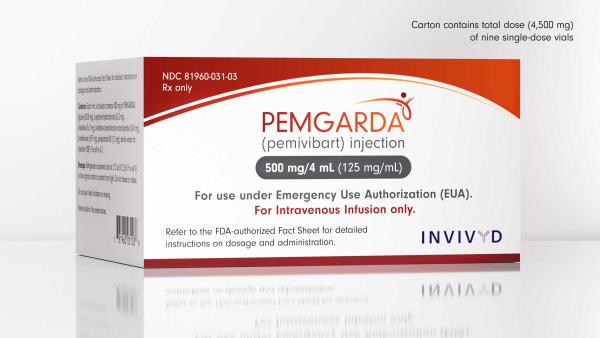Pemivibart
Generic name: pemivibart
Brand name: Pemgarda
Dosage form: intravenous solution (500 mg/4 mL)
Drug class: Miscellaneous antivirals
What is pemivibart?
Pemivibart is an experimental medicine being studied for the prevention of COVID-19 before being exposed to COVID-19. This drug is still being studied and all of its risks are not yet known.
Pemivibart does not replace vaccination against COVID-19.
The US Food and Drug Administration (FDA) has authorized emergency use of pemivibart for prevention of COVID-19 in adults and children at least 12 years of age who weigh at least 88 lbs (40 kg) and:
-
who are not currently infected with COVID-19;
-
have not had a known recent exposure to someone infected with COVID-19;
-
have a weak immune system (due to a medical condition, certain medicines, or treatment); and
-
for whom other COVID-19 vaccination options will not work.
Your doctor will determine if you are able to receive pemivibart.
Pemivibart is not authorized for use:
-
to treat COVID-19; or
-
if you are infected with COVID-19, are waiting for testing results, or are exposed to someone infected with COVID-19.
Pemivibart may also be used for purposes not listed in this medication guide.
Pemivibart side effects
Get emergency medical help if you have signs of an allergic reaction: hives, difficult breathing, swelling of your face, lips, tongue, or throat.
Some side effects may occur during and after receiving the pemivibart injection. Tell your medical caregivers if you feel dizzy, nauseated, light-headed, itchy, sweaty, or have a headache, chest tightness, back pain, trouble breathing, swelling in your face, flushing (sudden warmth, redness, or tingly feeling), ringing in your ears, or have fast heartbeats.
Your treatment may be permanently discontinued if you have certain side effects.
Common side effects of pemivibart may include:
-
pain, bruising, swelling, warmth, redness, a possible infection, or bleeding where the IV needle is placed;
-
feeling unwell during the injection;
-
flu-like symptoms, cold symptoms, viral infections;
-
headache, tiredness; or
This is not a complete list of side effects and others may occur. Call your doctor for medical advice about side effects. You may report side effects to FDA at 1-800-FDA-1088.
Related/similar drugs
Warnings
The US Food and Drug Administration (FDA) has authorized emergency use of pemivibart for prevention of COVID-19 in adults and children at least 12 years of age who weigh at least 88 lbs (40 kg).
Some side effects may occur during or after the injection. Tell your medical caregiver right away if you feel light-headed, chest tightness, trouble breathing, or swelling in your face.
Before taking this medicine
You should not use pemivibart if you are allergic to it.
Tell your doctor if you have or ever had:
-
received or scheduled to receive a vaccine;
-
an allergic reaction to a COVID-19 vaccine or a previous dose of pemivibart;
-
a serious illness or a weak immune system (caused by disease or by using certain medicines); or
-
any allergies or other medical conditions.
You should not receive pemivibart if you have recently received a COVID-19 vaccine. You should wait at least 2 weeks after vaccination to receive pemivibart.
It is not known if pemivibart will harm an unborn baby. Tell your doctor if you are pregnant or plan to become pregnant.
Ask a doctor if it is safe to breastfeed while using pemivibart.
How is pemivibart given?
Pemivibart is given as one dose over 60 minutes as an infusion into a vein. A healthcare provider will give you this injection.
Tell your medical caregivers if you feel any burning or pain when pemivibart is injected.
You will be watched during and for at least 2 hours after the infusion to make sure you do not have a severe allergic reaction.
Your doctor will determine your treatment schedule. You may need to receive additional doses every 3 months for ongoing protection against COVID-19.
Pemivibart may not protect against all variants of COVID-19. Tell your doctor right away if you have signs or symptoms of COVID-19. You should also test for COVID-19 if this occurs.
What happens if I miss a dose?
Call your doctor for instructions if you miss an appointment for your pemivibart injection.
What happens if I overdose?
In a medical setting an overdose would be treated quickly.
What should I avoid while receiving pemivibart?
Follow your doctor's instructions about any restrictions on food, beverages, or activity.
What other drugs will affect pemivibart?
Other drugs may affect pemivibart, including prescription and over-the-counter medicines, vitamins, and herbal products. Tell your doctor about all other medicines you use.
More about pemivibart
- Check interactions
- Compare alternatives
- Side effects
- Dosage information
- Drug class: miscellaneous antivirals
- Breastfeeding
- En español
Patient resources
Other brands
Professional resources
Other brands
Related treatment guides
Further information
Remember, keep this and all other medicines out of the reach of children, never share your medicines with others, and use this medication only for the indication prescribed.
Always consult your healthcare provider to ensure the information displayed on this page applies to your personal circumstances.
Copyright 1996-2025 Cerner Multum, Inc. Version: 4.01.

